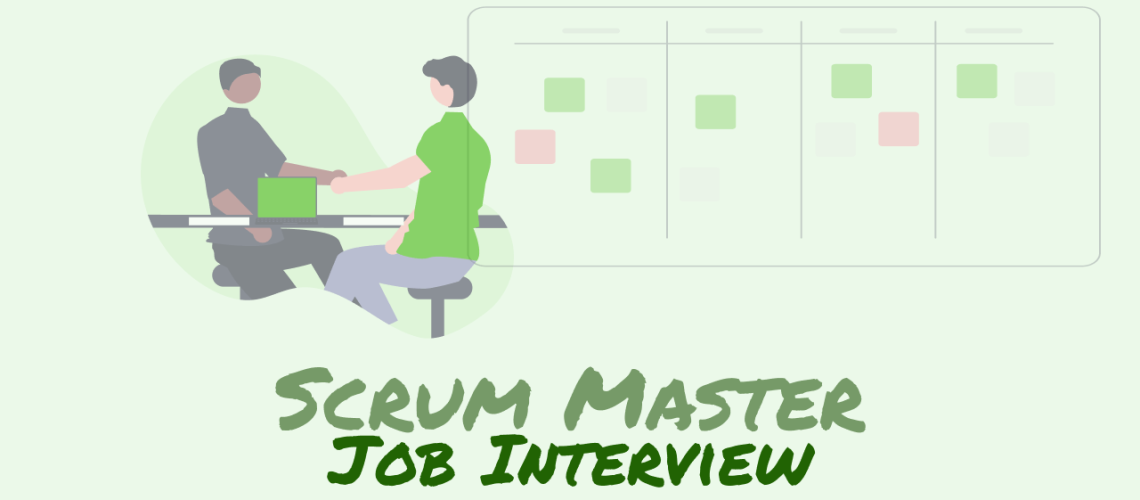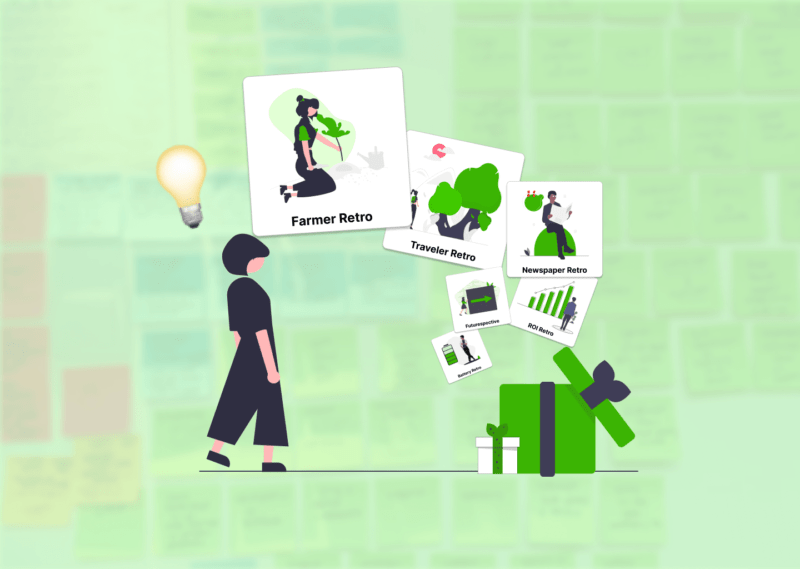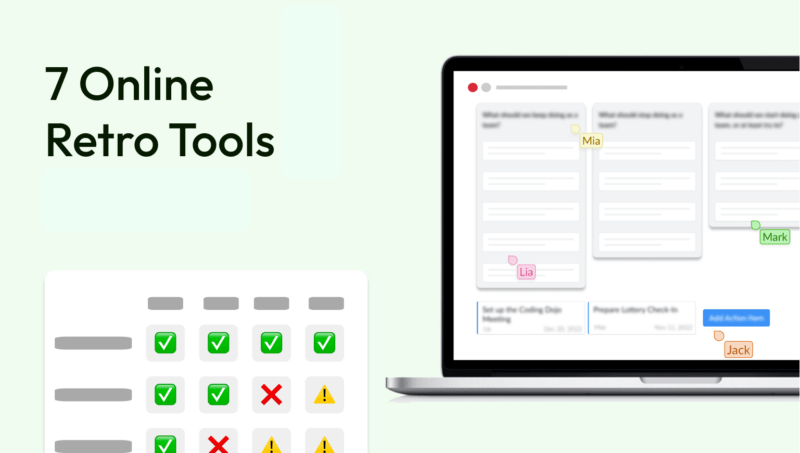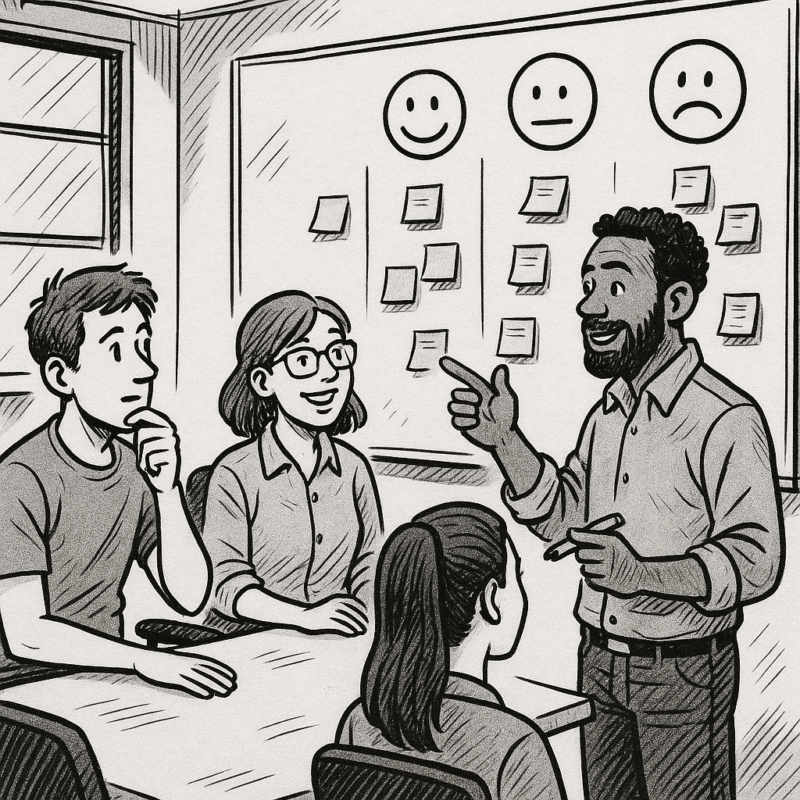There are dozens of websites with interview questions for Scrum Masters. But from my point of view, there is only 1 interview question for Scrum Master’s that is crucial. And if you as an applicant know the answer, you might even get the damn job right on the spot!
The question (and answer) itself is so good that you as an applicant should even try to actively talk about it in every Scrum Master job interview. No matter if they asked for it. Because when I personally look at the interview questions for Scrum Masters that are suggested online for job interviews - many of them are simply bad Scrum Master interview questions.
A Servant Leader knows that one should be "leading with questions". As an applicant, why not exemplify this in the job interview? So if it doesn't come up, then you should bring this one question (including the answer of course) up in every Scrum Master job interview. This would also answer the question “how to introduce yourself as a Scrum Master in an interview” - by saying you want to talk about this one question.
So if you are wondering how to prepare for a Scrum Master interview: Look at the question including the answer. You can also integrate the answer into the question "Why should we hire you as a Scrum Master". But which question do I mean now?
We'll get to that in a moment. Just one last note: The question can basically be asked in almost any context. No matter if you're looking for managerial round interview questions for Scrum Master, scenario based interview questions for Scrum Master, or behavioural interview questions and answers for Scrum Master. In any regard, the topic of this blog post is relevant. It is only less likely to be considered a technical interview question.
Scrum Master interview questions
Interview question for Scrum Master: What is being evaluated?
Typically, interview questions for Scrum Masters evaluate candidates on four levels.
- Personal fit: Can your potential colleague or manager imagine working with you successfully - looking at your personality, energy, presence?
- Rule of thumb that some recruiters use to decide between candidates: If this applicant would be my boss - would I myself like to work for her/him?
- Skills: Do you have the necessary skills for the job (e.g., could you confidently facilitate a workshop, moderate conflicts…)?
- Knowledge: Do you have the necessary knowledge for the job (e.g., do you know the Scrum theory etc.)? This is often the focus of Scrum Master Interview questions found online .
- Cultural fit: Do you fit in with the company culture looking at your personality, attitude and values?
Scrum Master interview questions
Interview question for Scrum Master: What you can train for
I have deliberately ordered these 4 aspects in this order - according to their assumed importance. So generally, you should try to focus on making a good impression firstly on a personal level and then on the other levels. And, as you might have guessed, the interview questions for a Scrum Master role itself are not really relevant for showing your personal fit - that rather happens on the side.
- Personal fit: If your future manager for some reason doesn't like you based on the impressions from the job interview, he will have decided against you within a very short time, possibly even within minutes.
Is this something you can train, prepare for, as an applicant?
no You can't and shouldn't practice this. Imagine you are pretending. And then your real personality comes out during work and your manager is completely surprised. Who would want to work with a manager who after a short time in practice no longer likes you?
There's only one thing you can customize: your appearance. Make sure you're wearing the right clothes, your haircut is appropriate, etc. This may improve the first impression. - Skills: If you seem like you're very good at serving as a Servant Leader, you've reached the next major milestone. This means that you can convincingly demonstrate that you are a good facilitator, that you can resolve conflicts or that you can solve typical challenges with agile working –, ideally based on experience that goes beyond the textbook.
Is this something you can train, prepare for, as an applicant?
Yes. However, this is something that can only be trained through hands-on experience and will be difficult to practice for a Scrum Master interview within only a few weeks or days. The more experience you have in meeting facilitation, agile leadership, and an agile IT environment (if the Scrum Master job is in that context), the better.
What is actually being evaluated in the Scrum Master job interview? Various criteria which should have a different priority for you.
3. Knowledge: If you've convinced on the first two levels, honestly, I think you are already more than 50% through. After all, how important is it now that you have memorized and can recite the 5 agile Scrum values or the 5 phases of a retrospective? Let's face it, it's good to know - but it's not going to be critical to get the job. This is why you should handle many online Scrum Master interview question suggestions critically as they are focusing on such questions. If you are asked interview questions for SAFe Scrum Master's for example, not only knowing what SAFe is, will help, but even more impressive will be to already have experiences in this environment (“skills” having more value than “knowledge”)
Is this something you can train, prepare for, as an applicant?
Yes. It can be trained, even in the short term. Many applicants focus on this. But you should do so in a smart way. You should focus on the big picture. Again, more on this below.
4. Cultural fit: This is what the HR person in the room might double check - do you also fit the organization culturally? An example: The organization you are applying for has the company values of "openness, innovation and customer centricity". (How close was my guess?).
So you might think of examples in advance that show that you fit those organizational values of your target employer - “name a situation you showed openness within a workplace, e.g. introducing a new tool etc.? Name a situation where you thought out of the box, have been innovative…”. But yes, don’t over prepare for this one: It is very rarely the deciding factor. In my experience, if the interviewers like you, they will also argue for you being a cultural fit for the company. See the halo effect.
Is this something you can train, prepare for, as an applicant?
A little. See my example in the paragraph before this. Generally, the same applies as for "Personal Fit" above. Any cultural question will not be the most important one from all the interview questions for a Scrum Master role.
As you can see, you can train your skills and knowledge. Skills, however, are typically trained through experience. And you can't just catch up on that one week before the Scrum Master interview - or can you organize 10 retros in one week before the job interview to gain experience?
Right, that will be difficult. That's why this article focuses on point 3 and tries to provide you with knowledge and a specific approach. Because you can acquire this knowledge in a very short period of time and possibly cover up some of your weaknesses (in case you have such 😉).
Interview questions and answers for Scrum Master role
Interview questions for Scrum Masters: The hardest one
To be honest, I don't even know if it's the most difficult interview question for Scrum Master’s. But it is the most important interview question from my point of view. It is the Scrum Master interview question where you have to deliver. Which simple question is it?
Well, it's obvious: How will you successfully coach your agile teams?! What is your approach, your roadmap, your plan to make the teams even more successful - possibly in the context of more agile teams or an agile transformation?
Interview questions and answers for Scrum Master role
Answering the question - Part 1: Customer centricity and openness to methods.
To answer this question, we will start with the following rationale that you can adapt as you like:
The job of a Scrum Master is actually not about Scrum. It's not about agile methodologies. It's about delivering a product or product increment to the customer so that the customer is as satisfied as possible - and all other stakeholders with him. That's by the way the reason why the word "customer value" should come up very often in your Scrum ceremonies. It is all about delivering value. How you do it is not that important.
Whether Scrum, Kanban or any other framework is best suited for this is something you have to find out - in an agile way. Even if your interview partner claims that it is already decided "we will definitely do Scrum", you should bring this perspective into the conversation.
Questions for Scrum Master interview
Interview questions Scrum Master: Focusing on value
By the way, Cesario Ramos on Scrum.org goes so far as to say that too little focus on "value" can be the reason for boring Sprint Reviews with little participation.
Maybe they even ask a "trick question" on this - “why is Scrum always the best framework?”. Then you know - it isn’t. There are situations where waterfall is the best. They will expect you to tell them that Scrum is just a framework within agile working methods and not necessarily the solution for everything. From experience, sharing these reflections openly leaves a positive impression in job interviews with HR or other executives.
To conclude with the first part: you should understand the complexity around customer value, team value, product value, and business value. If you don't consider the customer value and focus only on the team (i.e., team satisfaction), management will soon call you a "tree hugger" (been there several times...).
So this is a common pitfall that can be avoided and part of how you should answer the hardest question from all the interview questions for a Scrum Master position: How will you successfully coach your agile teams?
Questions for Scrum Master interview
Answering the question - Part 2: Don't be afraid of KPIs
Now after you underlined that you see your Scrum Master role as someone who creates the perfect conditions for the teams to create value, the next question is, how to proceed? My suggestion: Continue through outlining an approach any leader in your new organization and a professional Agile coach would love. Show them how you will successfully coach your agile teams by proposing 4 clear KPIs, clear success metrics for your own work.
Questions for Scrum Master interview
A note in advance
Short preface: Yes, we know that success metrics for Scrum Masters are controversial in the agile community. But put yourself in the shoes of other roles for a moment: It doesn't matter if it's sales, marketing or HR - all functional areas can be measured by metrics. And again, of course, metrics never tell the whole story, but they are at least an indicator and starting point for constructive discussions.
So no matter which interview questions for a Scrum Master position you will encounter, don't make the mistake of saying "There are no KPIs for my role and I refuse to continue that thought" but be open to making your goals as a Scrum Master measurable and demand and encourage a constructive approach to success metrics.
If you can show your interviewer a clear methodology by which you work and how you (and he/she) can evaluate you later, you'll be ahead of most of your competitors. Especially when you are looking for managerial round interview questions for a Scrum Master or interview questions for SAFe Scrum Master’s, I am sure this question & answer will be met with favor.
Interview questions for experienced Scrum Master
Interview questions Scrum Master: The 4 Metrics for Scrum Master Performance
I hereby propose 4 KPIs based on my experience & knowledge as a psychologist and Scrum Master. Ultimately, these metrics are not about the metrics metrics themselves. Of course, that would be a big mistake. Rather, they are about getting clear on your most important goals (!) and measuring their level of achievement in the best possible way.
- Customer Value: This is the most important outcome your team delivers - and therefore an important metric for you. Is the customer getting the value they want delivered? Is their problem or pain solved? This can be measured by several KPIs:
- Customer Satisfaction: whether it's Net Promoter Score (NPS) or some other scale, it doesn't matter. It should be measured as objectively as possible, how satisfied the (external or internal) customer is with the product or feature that your teams have delivered.
- Other objective metrics: Usage statistics, support requests, revenue etc....
The next question (after that core question we already talked about twice now) is basically: what framework do YOU need to create, so that the team can deliver the best possible customer results in the shortest time, sustainably and predictably?
- Continuous improvement: The second most important goal of a Scrum Master is "Continuous Improvement". No matter how bad the team is doing. If it is good at continuously improving - then there is hope that it will get better.
Continuous improvement is more of a characteristic than a metric. It can be measured by several things - Is customer satisfaction going in the right direction? How is subjective productivity evolving, how is team satisfaction evolving, how quickly are challenges being overcome? Is there a regular sense of achievement?
- Psychological Safety & SatisfactionHere we would be at a precondition for being able to contribute ideas in order to continuously improve. Only when I feel psychologically safe and satisfied can I be sustainably productive and improve. This should be one of your key metrics and it is definitely something you can work on and sustainable be productive and improve myself. You can improve this variable very well and also measure, for example through the Echometer tool.
- Goal achievement: This goal is about creating trust on the part of the customer and on the part of the stakeholders. If the customer wants a feature - can he assume that it will be delivered on time in an agile way, as he imagined? Certainly not easy to achieve, but it is the ideal. There are some sub-metrics you as a Scrum Master can draw on for this.
- Predictability: So how predictable are we with our increments? Are we getting better at estimating?
- Burn up & Burn Down charts: these also help very well in retrospectives to reflect specifically on causes for current performance.
By the way, these four levels come from the article "Scrum Master Performance", where you can find even more in-depth information. Additionally, I also wrote a post on "25 agile metrics and which one" is the most important one.
So this is how you prepare for a Scrum Master interview - study this or a different approach to how you will make your agile teams successful. If they ask you why they should hire you as a Scrum Master, part of your answer could be saying that you believe you have the best, data driven approach to solving their current agile challenges that will also help other agile practitioners in their organization.
Most Agile Coaches and Scrum Masters run in circles...
...fixing superficial symptoms. Time to use psychology to foster sustainable mindset change.
Basic Scrum Master interview questions
An example of how to use this model
You can hopefully also see why this approach is relevant to both behavioural interview questions and answers for Scrum Master’s and scenario based interview questions for Scrum Master’s. You should always look at your core objectives as a first step. For example, if the question comes up about how you're going to resolve a conflict between two colleagues, you pull out the model and ask the counter question: what are the consequences on our metrics of this team conflict? Okay, there are consequences on team satisfaction obviously. But at the same time, the customer seems to be particularly satisfied at the moment. Strange - maybe the fact that the two disputing colleagues are challenging each other intensively leads to a better quality of the team’s output? They ask more challenging questions than ever before - and that has a positive effect! Given this, the team conflict might be solved differently than a purely destructive relationship conflict.
Questions for Scrum Master interview
Interview question for Scrum Master: Conclusion
Do you now know how to impress your interview partner? I hope so. Namely by discussing with her/him what the core goals of Scrum Masters actually are and how to best make them visible. That is the most important interview question for Scrum Master’s. Instead of checking out more “Interview questions Scrum Master”, you should make sure to be able to answer this question.
If you discuss this, then you will have a good interview, you will impress your interview partner. You will have a lively conversation at eye level instead of a one-sided "hearing".
As I mentioned, to people asking “how to introduce yourself as a Scrum Master in an interview”, “how to prepare for a Scrum Master interview” or for a smart answer to the question "Why should we hire you as a Scrum Master" - I would recommend taking this one question into account.
You could hopefully form your opinion based on what I said. And thus drastically increase your likelihood of getting your dream job! If you have any questions or comments, please feel free to contact me.








